Applying Herzl’s thinking to understand better this defining biblical event, and its implication to today
Reprints from THE JERUSALEM POST; BY GOL KALEV, june 9, 2023
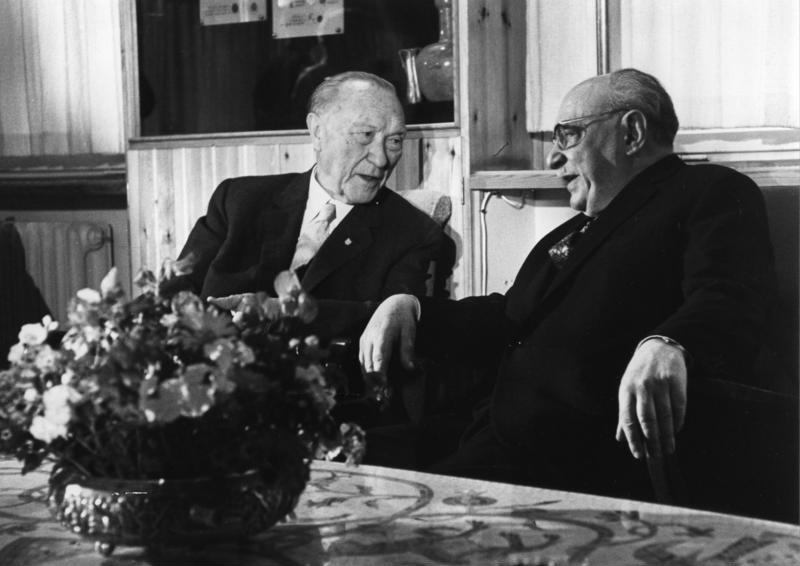
Before delving into analysis of the story of the 12 spies, one needs to comprehend two key aspects of the environment: The pro-Egypt sentiment, and the easily-manipulated public opinion.
Pro-Egypt sentiments awakened
As travel from Sinai began, the quest to return to Egypt reemerged. The previous time such calls to return to Egypt were made – a year prior, during the travel from Egypt to Sinai – it was about Egypt being the lesser of two evils (“it is better for us to serve Egypt than to die in the desert”). Now the campaign has a more appealing message – life in Egypt is good: “We remember the fishery, which we eat in Egypt for free; the cucumbers, and the melons, and the leeks, and the onions, and the garlic.” Not only are they served a fruits-de-mer platter in Egypt, but it is free!
The pro-Egypt messaging did not end with praising life in Egypt. As we are familiar from modern-day public-relations campaigns, it also trashes the alternative – the manna. It then resorts to the good-old argument of calamity: The manna is not just displeasing, but also dries the soul!: “But now our soul is dried away; there is nothing at all; we have nothing but manna to look to.”
The protest movement seems to be effective. God agrees to provide meat for a full month! (Its consumption turned out to be fatal.) This, along with Moses ceding power to a council of 70 elders is sufficient to placate the masses for now. Moreover, an unexpected external threat that suddenly emerged (Miriam’s leprosy) united the nation. And so, while the core issue of “to Egypt or to Israel” is unresolved, this round was successfully “shoved under the rug.” This allows the completion of travel to Kadesh. Once in Kadesh, Moses is ready to execute a plan to deal with the pro-Egypt opposition!
Easily manipulated public opinion
The second component of the environment that impacts the dispatching of the 12 spies, is the apparent high susceptibility of the Israelites to being influenced.
For months, the nation has been in unison with God and Moses, building the Tabernacle impeccably to God’s specifications, over-donating, engaging in a 12-day inauguration ceremony and beginning the orderly journey towards the Promised Land.
While opposition awakens as travel begins, the Torah emphasizes that this opposition was merely on the fringe. The fire that was meant to counter the ill-talkers was just at the outskirts of the camp, and the “lusting” occurred merely among the fringe multitude (“asafsuf”).
The core of the nation, one would think, is still in high morale, unaffected by the now two attempts by the pro-Egypt fringe to demoralize them. But this was not the case. As the Torah explains, that fringe was able to influence the rest of the nation: “And the multitude that was among them fell a lusting; and the children of Israel also wept on their part, and said: ‘Would that we were given flesh to eat!”
How can a small group of people sway public opinion so rapidly from one extreme to another?
The answer was provided by Theodor Herzl. In 1887, Herzl wrote a seemingly innocuous short story about a talent-agent (“impresser” or “promoter”) who turned an unattractive mediocre singer into the star of Europe using PR techniques such as paying people to storm the box office ahead of her performance. “The fools just follow the masses with closed eyes… From a piece of wood, I created a diva.” Herzl, through the protagonist, explains just how easily public opinions can be swayed: “Next time someone praises a work of art, the spirit of a man, or the beauty of a woman, check carefully who is the speaker: Is he a fool or a promoter?”
In the decade that followed, Herzl carefully studied the strategies of a real-life promoter: Otto von Bismarck, who unified Germany. “And out of what was this unification created? Out of ribbons, flags, songs, speech,” Herzl writes in 1895.
So if a promoter can turn a mediocre singer into a star, and if Bismarck can turn a collection of principalities and individuals into an empire, it is no surprise that a group on the fringe can turn an entire nation to crave the cuisine of Egypt.
Moses seemingly learns lessons from the pro-Egypt opposition. Internalizing the importance of public perception, he sends a delegation of 12 opinion leaders, “heads of the sons of Israel,” to the Promised Land, and tasks them with a clear mandate: “Strengthen”
The 12 presidents were to come back with fruit of the land. Praising the Promised Land would strengthen the nation, who would proceed towards Israel.
But that is not what happened. Ten of the 12 spies stunned Moses and defected to the pro-Egypt camp, talking ill about the land. In doing so, putting an end to that generation’s quest to come home to the Land of Israel. It would take another 38 years for their descendants to do so.
Perception trumps reality
Indeed, perception created by public-relations campaigns often defeats reality. As discussed in the Magazine, when the high-speed train between Jerusalem and Tel Aviv was launched in 2018, an aggressive media campaign instilled broad public perception that trains get stuck in tunnels, often canceled and arrive late. In spite of a stunning on-time record of over 95%, one could not convince a person in Tel Aviv that I took the train from Jerusalem and it worked! (see Magazine article: The Jerusalem fast-train vs the powerful media, May 2019).
Just as the perception created by the promoter in Herzl’s story defeated the reality of a mediocre singer; just as the perception of the glamorous life of fruits-de-mer cuisine in Egypt defeated the reality of “iron plant” enslavement, so did the perception created by the 10 spies of “a land eating its inhabitants” defeat the reality stated by Joshua and Caleb: “the land is very very good.”
What went wrong?
Is it possible that Moses underestimated the depth of the pro-Egypt energies? Was he surprised that it engulfed even the elite (presidents)? Was the replacement of seasoned presidents with new ones that occurred just prior to the dispatching of the spies a contributing factor? Were the new presidents more vulnerable to public pressure? (See upcoming article).
Similarly, did Joshua and Caleb, the two loyal spies, underestimate the anger that would be directed toward them – not just boycotts and social shaming, but violence and even an assassination attempt. Or, as can be ascertained from the biblical story, they fully understood the price they would pay, and chose to fight for their cause against the powerful stream of public opinion?
An attempt to answer these questions was made over 3,000 years later, by the third president of the renewed State of Israel, Zalman Shazar. He wrote a poem titled “Where are you Caleb? (“Ayeka Kalev?”): “At times of confusion and dispute, brotherly quarrel in the camp… I observe and wonder, and my heart yells: Where are you Caleb?”
The writer is author of Judaism 3.0: Judaism’s Transformation to Zionism (Judaism-Zionism.com). For more of his biblical analysis, see ParashaAndHerzl.com
THIS ARTICLE FIRST APPEARED IN THE JUNE 7, 2023 JERUSALEM POST MAGAZINE – CLICK FOR THE PDF OF THE MAGAZINE:
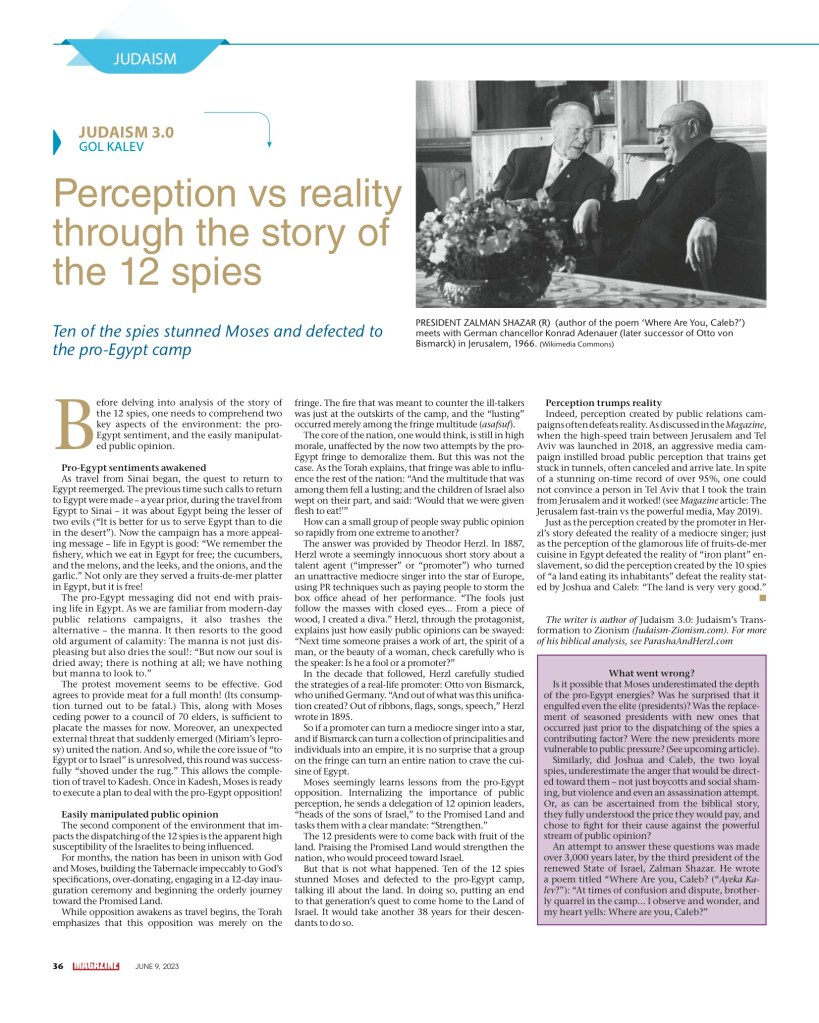
Related articles by Gol Kalev:
To Egypt or to Israel? (Jerusalem Post)
A transformation is recognized by Caleb and Joshua in the Parasha and later recognized by Herzl
Herzl can help defuse today’s strategic issues (Jerusalem Post)
A deeper understanding of Herzl’s vision can help us apply his frameworks braodly
Passover as Jewish particularity (Jerusalem Post)
Herzl created a new anchor for Judaism, having concluded that the primary malaise of 2,000 years of exile was not the persecution, but rather the lack of unified Jewish political leadership
The essence of the exodus from Egypt and from Europe (Jerusalem Post)
The exodus from Egypt and the one from Europe 3,000 years later are so similar that biblical critics in the far future might argue that they were on and the same
Zionism as the anchor of Judaism (Jerusalem Post Special Magazine)
Whether one likes it or not, Zionism is becoming the organizing principle of the Jewish nation-religion. It is the primary conduit through which both Jews and non-Jews relate to Judaism, whether positively or negatively. It is the one aspect of Judaism that evokes emotions, passion, anger, pride and engagement.
Related videos:
Gol Kalev at the Jerusalem Leaders Leaders Summit: Judaism 3.0 as a paradigm shift in the battle against anti-Zionism
TML News report of the Judaism 3.0: Theodor Herzl – the solution to Israel’s Modern problems?
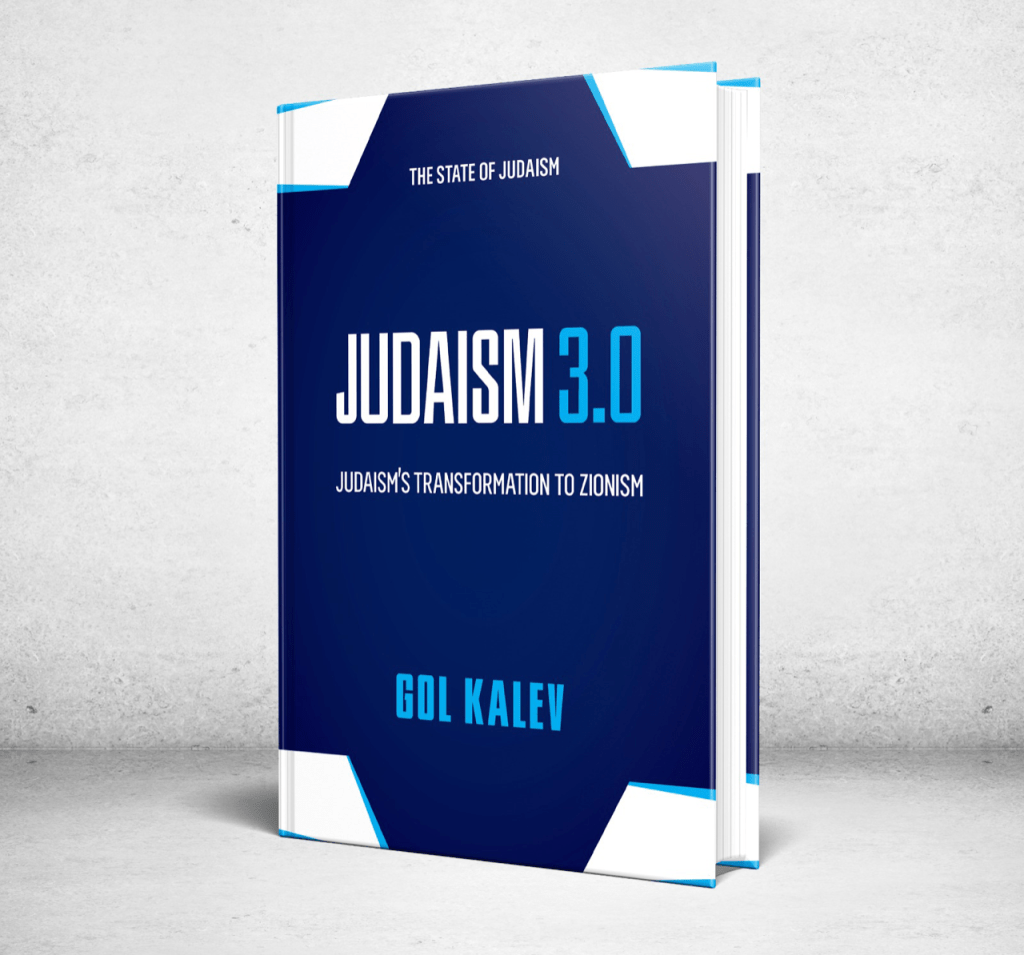

The following is a Jeruslaem Post series about the implications of Judaism 3.0:
This generation’s existential threat to Judaism
Applying Herzl’s thinking to counter Israel-bashing

Occuptionalism: The new form of Colonialism is hijacking the Palestinian cause
Occupationalism is enabled by the Jerusalem-based “Conflict Industry,” known for its lavish parties, insularity, high turnover and its own social hierarchy

European blood libels continue, but now there is a solution
Recognizing that we are in Judaism 3.0 would address existential threats to Judaism, but it would also provide Jewish clarity that would advance humanity

Judaism 3.0: Turning threats to Judaism into enablers of its survival
Like antisemitism in Herzl’s time, today’s Israel-bashing and assimilation of American Jewry also have hidden assets in them

Passover to Shavuot and the American-European divide
How the transition affects today’s geopolitics, the flaws of democracies and the emerging rift: Americanism vs. Europeanism

Threat to Judaism through friends, influenced by Israel-bashing movement
Applying Herzl’s thinking, the threat to Judaism might come through our friends. Such Israel-bashing-light was showcased in the Basel Zionism celebrations in 2022

A broad recognition of Judaism 3.0 would release the Arabs of the Middle-east from debilitating European dogmas that have occupied their true character for the last 100 years

See in Link: Applying Judaism 3.0 to the countering Israel-Bashing
See also The Jerusaelm Report 2022 New Year Magazine: Judaism’s transformation to Zionism – Countering the Israel-bashing movement
Recognizing that Judaism has transformed would rob the Israel-bashers of their starting point: The premise that Judaism is merely a religion.

Summary of above articles:
Gol Kalev shows how Israel-bashing is today’s existential threat to Judaism, having both a populous dogmatic retail component – Occupationalism, and institutional destruction mechanisms that deploy modern-day blood-libels. In such circumstances, Hasbara (Israeli PR) is futile. Yet, a broad global recognition that Judaism has transformed to Judaism 3.0, and Zionism is now its anchor, would dramatically mitigate the threat.
Taking it a step deeper, Gol then explores the depth of the existential threat by showing how the break from centuries old system of Divine-right-monarchy, created a bifurcation: Divine-right-republic in the United States and non-Divine neo-monarchy in Europe. Deploying Herzl’s political philosophy and his view of the inseparability of corruption from parliamentary Democracy, Gol demonstrates the imbedded danger of a system of “following laws” as opposed to doing so alongside an ideological Divine conscienceless: Passover to Shavuot and the American-European Divide
Gol then shows how Israel-bashers must stay in Judaism 2.0. A broad global recognition that Zionism is now the anchor of Judaism would rob Israel-bashers of their starting point, and would emancipate Palestinians and other Middle-Eastern Arabs from the debilitating European Occupation of their true character, which in turn would lead to peace: Paving the path to peace
For more of Gol’s geopolitical articles: Europe and Jerusalem
Including:
Europe should benefit from Herzl’s vision
Europeanism vs. Americanism – a new global philosophical divide?
Judaism 3.0 as a cornerstone of the Biden administration’s efforts to counter antisemitism
GOL’S BOOK is NOW AVAILABLE oN AMAZON AND in stores in israel and the united states
Watch recap and video-clips from the book’s launch party: A revolutionary approach to countering Israel-bashing

Sign-up to get updates on the book’s launch events:
RELATED ARTICLES BY GOL KALEV: EUROPE & JERUSALEM
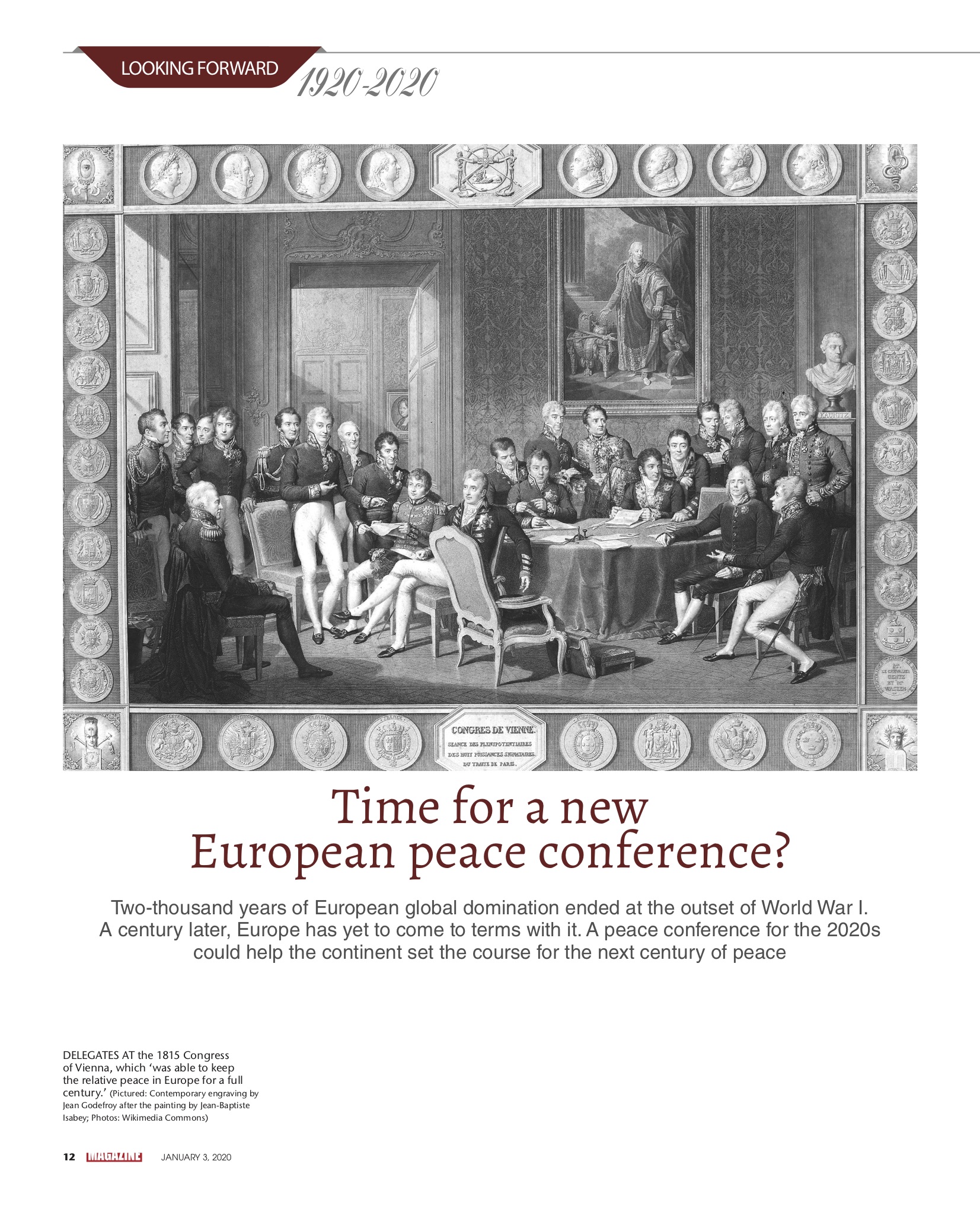

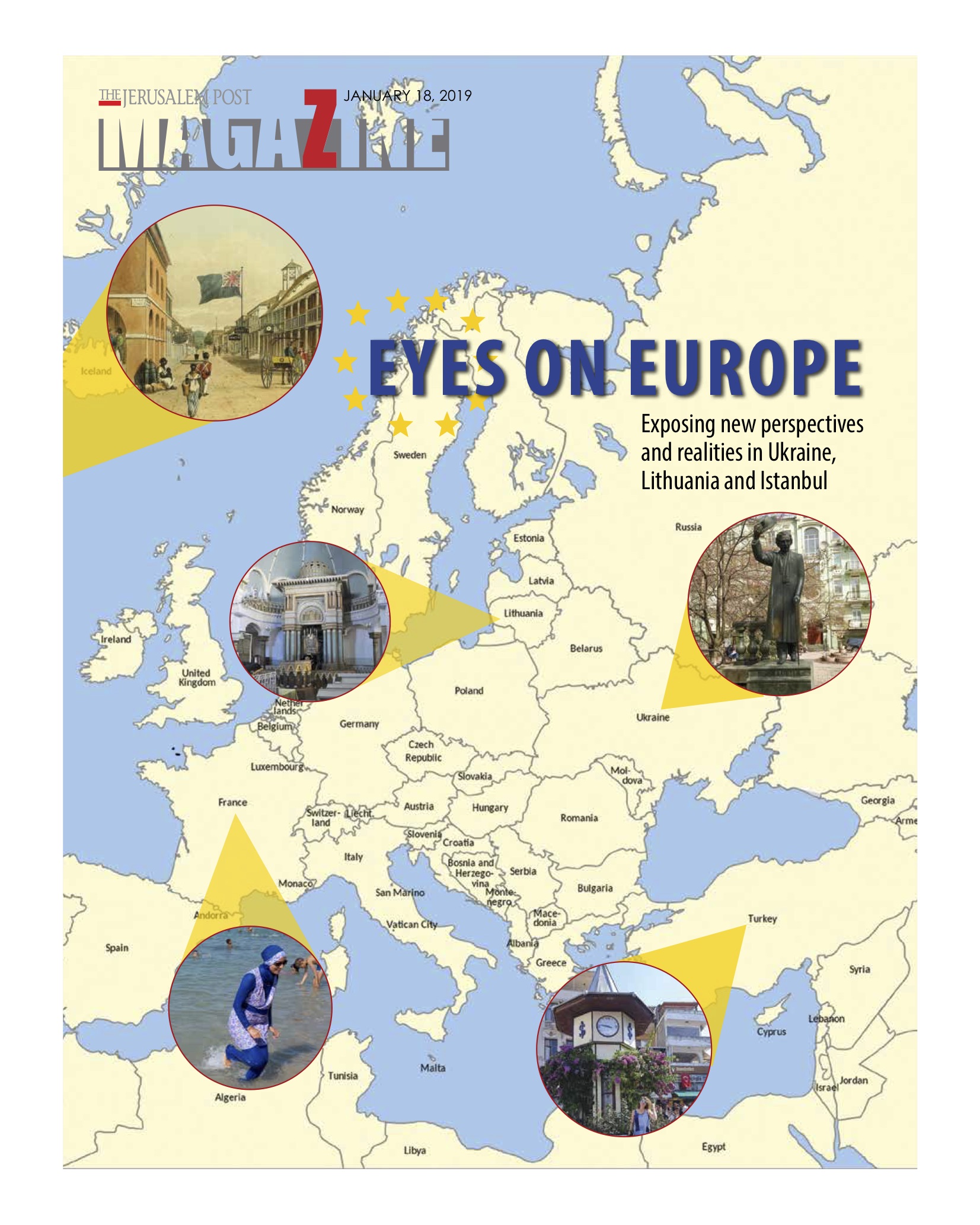


The resurfacing of European Colonialism
Hijacking the Palestinian cause
European opposition to the Jewish state
Time for a new European peace conference
Europe should benefit from Herzl’s vision
For inquiries/comments: info@europeandjerusalem.com
Watch Gol discuss his new book in an i24 interview